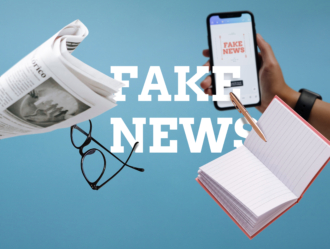Recently, the phrase media literacy has been increasingly used in social networks and the media
If literacy in general is the ability to write, read and transmit information correctly, then media literacy (or rather, media and information literacy (MIL) is a more specific concept that includes the following competencies:
-find accurate data
-highlight the key idea of the author
-critically perceive information
-to distinguish fakes from the truth
-take a responsible approach to creating and distributing your own content

So how do you recognize a fake in the post-truth era?
Media literacy is extremely important for a modern person, it develops critical thinking and allows you to identify lies and manipulations.
Example: a relative sends a link to the news in WhatsApp with the headline: “A virus worse than the COVID is walking around the city!”
You can forward this message to all your contacts, or you can approach the matter more responsibly:
Check the link visually. If there are a lot of strange symbols in it, and it doesn’t look much like the name of a verified media outlet, it’s better not to click on it at all, it could be phishing*
UNESCO emphasizes the role of media literacy as an essential competence in the digital age.
*Phishing is a type of Internet scam in order to gain access to your data
If the link does not cause suspicion, you can click on it and evaluate the news visually. Flashy headlines (bite), an abundance of pop–up ads and the lack of links to the source of information are what should alert you
Red flags: grammatical and punctuation errors in the text, lack of logical structure, profanity, overly emotional tone of presentation.
Let’s assume that everything is OK with the site. We are looking for a link to the source of information.
If there are links, go to them, evaluate the authority of the source.
What sources can I rely on?
-Official websites of government agencies (ministries, departments, etc.)*
-Websites of major international organizations
-Media and authors with a good reputation
* You should be especially careful with news that has a political background – here it is worth double-checking information from reliable government sources.
Type the title you are interested in into the search engine. If the information matches reality, you will see dozens of similar news. If nothing like this has been published in the major media, most likely, you are facing a fake.
You can always contact the relevant government agency and clarify the information there. As a general rule, citizens’ appeals are free of charge. Are you wondering if another deadly pandemic has overtaken us? Call the hotline of the Ministry of Health.
The example with the virus is extreme, but there are not such unambiguous situations. For example, you need to check the news about the purchase of a certain number of vaccines.
The state body is obliged to provide comprehensive information about your application.
It may sound strange, but also rely on your intuition – after all, we all live in the world of new media, consuming megabytes of content every day. And if everything is visually plausible, but something is bothering you – double–check again, it won’t be unnecessary.
Sources: Unesco.org Media literacy is a tool of manipulation
Coe.net. Media literacy
Fedorov A.V. Media education and media literacy



